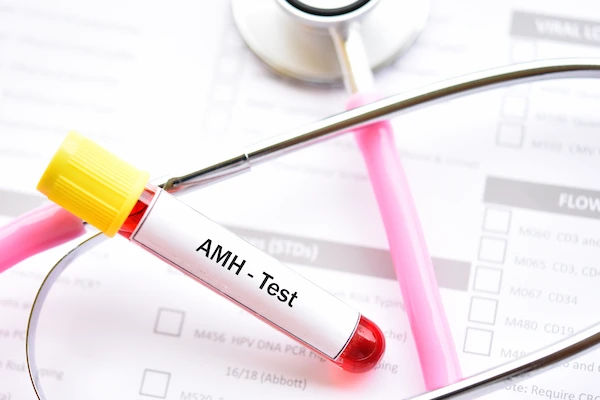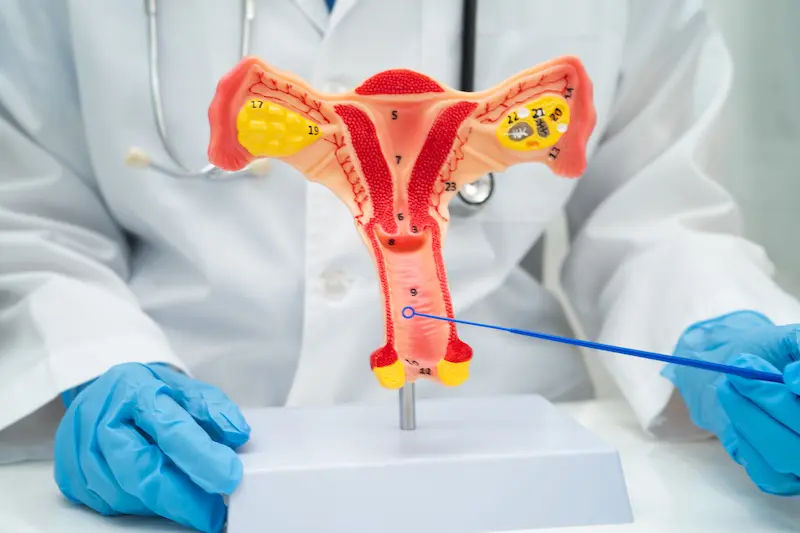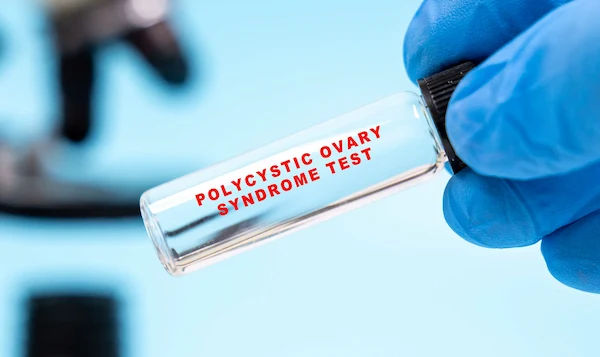AMH Levels Too Low? What It Means and What to Do Next
Low AMH levels may suggest reduced ovarian reserve, but they don’t rule out pregnancy. Learn what low AMH means, its causes, and fertility options available to support your next steps

Written by Dr. J T Hema Pratima
Reviewed by Dr. D Bhanu Prakash MBBS, AFIH, Advanced certificate in critical care medicine, Fellowship in critical care medicine
Last updated on 9th Sep, 2025

Finding out that your Anti-Müllerian Hormone (AMH) levels are lower than expected can be upsetting, especially if you are trying to conceive or planning for a future pregnancy. Low AMH is typically a sign of reduced ovarian reserve, which means the number of eggs remaining in the ovaries may be lower than average for your age.
While this result may raise questions and concerns, it does not automatically mean that pregnancy is impossible. Understanding what a low AMH level really indicates is an important first step toward making informed decisions about your fertility options. This article will explain the potential causes and implications of low AMH, clarify how it relates to egg quality, and outline fertility strategies and medical treatments that may help you move forward with confidence.
Understanding Low AMH Levels and Diminished Ovarian Reserve
Anti-Müllerian Hormone (AMH) is produced by small, immature follicles in the ovaries. It serves as a reliable marker of ovarian reserve, that is, the estimated number of remaining eggs. A low AMH level typically indicates a reduced ovarian reserve, which may influence fertility and reproductive planning.
What Causes Low AMH in Women
While declining AMH levels are a natural part of ageing, especially after the mid-30s, several other factors can contribute to diminished ovarian reserve:
- Natural ageing: AMH levels naturally decline with age, especially after 35, reflecting a gradual decrease in egg supply.
- Premature Ovarian Insufficiency (POI): A condition where ovarian function declines before age 40, often resulting in significantly low AMH.
- Genetic causes: Conditions like Turner syndrome or Fragile X premutation can impact ovarian development and reduce AMH production.
- Ovarian surgery: Surgical procedures involving the ovaries, such as those for endometriosis or cyst removal, may reduce healthy follicular tissue.
- Chemotherapy or radiation: Cancer treatments can damage ovarian follicles and accelerate the loss of egg reserve.
- Endometriosis: Particularly when it involves ovarian endometriomas, this condition can negatively affect follicle count and lower AMH.
- Autoimmune disorders: Certain autoimmune diseases may impair ovarian function by triggering inflammation or attacking ovarian tissue.
What It Means for IVF or Natural Conception
A diagnosis of low AMH may have several implications, depending on your age and fertility goals:
- Shorter Fertile Window: With fewer eggs remaining, your timeline for natural conception may be shorter than average.
- Natural Conception: Still possible, but may be more difficult due to reduced egg availability during ovulation.
- Response to Fertility Treatments: Women with low AMH may respond less robustly to ovarian stimulation during IVF, yielding fewer eggs and potentially fewer embryos. However, IVF can still be effective with a tailored approach.
Low AMH levels indicate a reduced egg quantity, but egg quality is primarily influenced by age. As women get older, the likelihood of chromosomal abnormalities in eggs increases, which can affect fertilisation, embryo development, and pregnancy outcomes. Therefore, when assessing fertility, doctors consider both AMH levels and age to provide a more accurate picture and develop a personalised treatment plan.
Get Your Fertility Potential Assessed
What to Do Next: When to Consider Supplementation or Treatment
Receiving a low AMH result can be emotionally challenging, but it's important to remember that it's a piece of information that empowers you to take proactive steps.
1. Speak with a Fertility Specialist
The most important next step is to consult a reproductive endocrinologist. A fertility specialist will:
- Review your AMH result alongside other hormone markers such as Follicle-Stimulating Hormone (FSH), Estradiol, and antral follicle count (AFC) via transvaginal ultrasound.
- Assess your overall reproductive health, age, and personal goals.
- Recommend a personalised plan based on your timeline, egg reserve, and other fertility indicators.
This comprehensive evaluation helps determine whether natural conception is likely or if assisted reproductive techniques should be considered.
2. Lifestyle and Nutritional Interventions
Although lifestyle changes cannot increase the number of eggs, they may help improve your overall reproductive health and egg environment. These changes may include:
- Diet and Nutrition: Eat a balanced, nutrient-rich diet focusing on antioxidants, omega-3 fatty acids, and lean proteins.
- Exercise: Engage in regular, moderate physical activity to support hormone balance.
- Stress Management: Incorporate practices like yoga, meditation, deep breathing, or counselling.
- Sleep Hygiene: Aim for consistent, restorative sleep to support hormone regulation.
- Avoid Environmental Risks: Reduce exposure to endocrine-disrupting chemicals, tobacco, and alcohol.
Your doctor may also recommend supplements such as:
- Coenzyme Q10 (CoQ10): May support mitochondrial function and egg quality.
- DHEA (Dehydroepiandrosterone): Sometimes prescribed in specific cases to enhance ovarian response, though it must be used under medical supervision.
- Vitamin D: Plays a role in hormonal health and fertility; testing and correcting deficiencies may be beneficial.
It’s essential to consult your physician before starting any supplement, especially if you are undergoing fertility treatments.
3. Fertility Treatment Options
Several treatment paths may be considered depending on your individual situation:
- Ovulation Induction with IUI: For women with irregular ovulation and otherwise healthy reproductive anatomy, ovulation-stimulating medications followed by intrauterine insemination (IUI) may be an option.
- In Vitro Fertilisation (IVF): IVF is one of the most effective options for women with low AMH. While lower AMH may result in fewer eggs retrieved, advanced lab techniques and embryo selection can help maximise the chances of success. Your doctor may use customised stimulation protocols to improve egg yield and quality.
- Egg Freezing (Oocyte Cryopreservation): For women not ready to conceive immediately, freezing eggs now may preserve future fertility. While success depends on both egg quantity and age, this option allows greater flexibility.
- Donor Eggs: For women with very low AMH or poor egg quality, donor egg IVF offers a high success rate. This allows the recipient to carry the pregnancy while using healthy donor eggs from a younger woman.
A low AMH level may shift the conversation around timing and strategy, but it does not eliminate the possibility of conception. With guidance from a specialist and a personalised approach, there are multiple paths to achieving pregnancy or preserving reproductive options.
Tracking AMH With Regular Testing
Anti-Müllerian Hormone (AMH) levels tend to remain stable throughout a single menstrual cycle, making the test a reliable indicator of ovarian reserve at any point in the month. However, AMH levels naturally decline over time as a woman ages.
Your doctor may recommend repeat AMH testing in certain situations, such as:
- Monitoring long-term fertility potential, especially if you are considering postponing pregnancy.
- Evaluating your response to fertility treatments, including IVF or ovulation stimulation protocols.
- Confirming previous test results or reassessing ovarian reserve following surgery, medication, or medical therapies like chemotherapy.
While AMH levels can offer useful insights, frequent testing is usually not required. Because the decline in AMH tends to be gradual, your doctor will suggest an appropriate testing frequency based on your age, medical history, and fertility goals.
Schedule Fertility Panel With AMH on Apollo 24|7
If your doctor has recommended an Anti-Müllerian Hormone (AMH) test or a full fertility panel to assess your ovarian reserve and reproductive health, selecting a trusted testing service is essential. Apollo 24|7 makes the process simple, secure, and accessible, delivering accurate results with the convenience and confidence you need.
Why Choose Apollo 24|7 for Your Fertility Health Checkups?
- Comprehensive Test Panels: You can choose to book a standalone Anti-Müllerian Hormone (AMH) Test or opt for a broader package like a Fertility Test Panel, which includes additional assessments for hormonal balance, ovarian function, and overall reproductive health, offering a more complete picture of your fertility status.
- Certified Accuracy: Tests are conducted in NABL-accredited labs, ensuring high-quality, accurate, and reliable results.
- Home Sample Collection: Enjoy the convenience of blood sample collection at your home, saving you time and providing privacy.
- Easy Online Booking: Schedule your test quickly and easily through the Apollo 24|7 app or website.
- Fast Digital Reports: Receive secure, detailed test reports online promptly, ready to share with your doctor.
- Trusted Brand: Benefit from the trusted expertise and healthcare legacy of Apollo Hospitals Group, one of India’s most respected medical networks.
Taking charge of your health has never been easier. With Apollo 24|7, you get access to dependable testing that helps you and your doctor make informed health decisions without delay. For the most accurate and current pricing for AMH tests, it is best to check the Apollo 24|7 website or mobile App.
Conclusion
Receiving a low AMH level can be a challenging moment, but it is a crucial piece of information that empowers you to take control of your fertility journey. It signifies a diminished ovarian reserve, indicating a potentially shorter reproductive window and challenges with natural conception or certain fertility treatments.
However, a low AMH is not a definitive end to your family-building dreams. By understanding its implications, the underlying causes, addressing concerns about egg quality (especially in relation to age), and exploring the range of available treatment options with a fertility specialist, you can create a proactive and informed plan. Remember, every individual's journey is unique, and with the right guidance and support, many women with low AMH can still achieve their goal of parenthood.

.webp)



